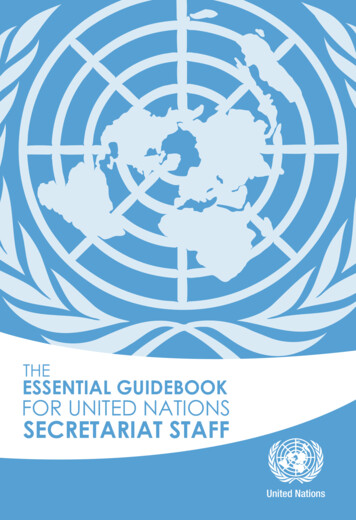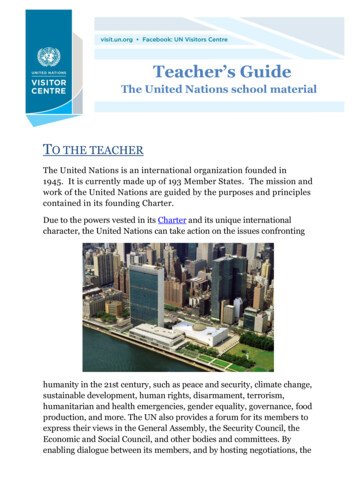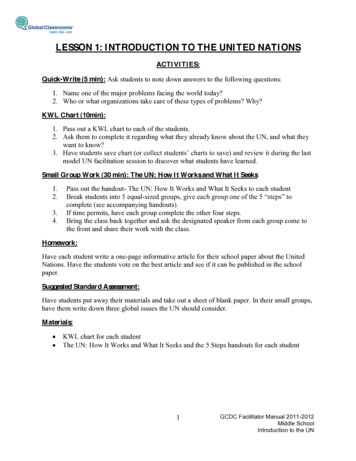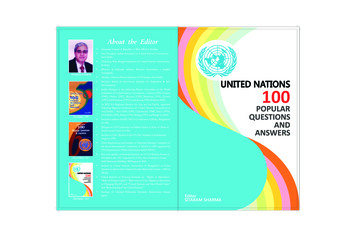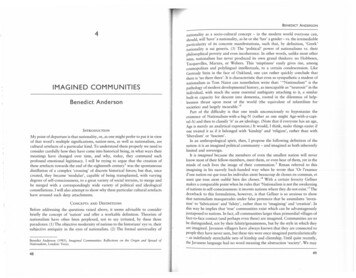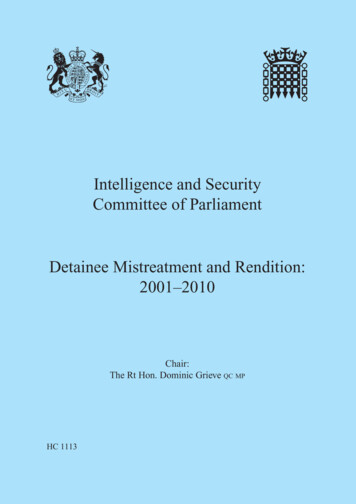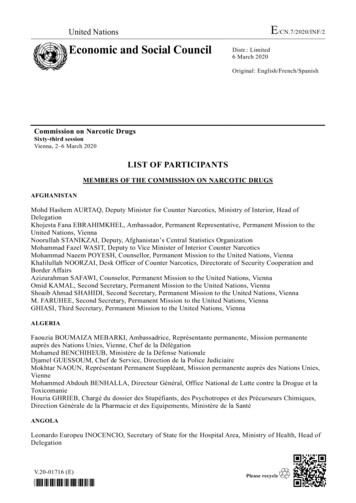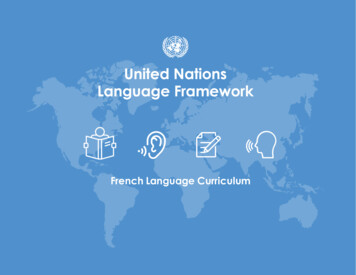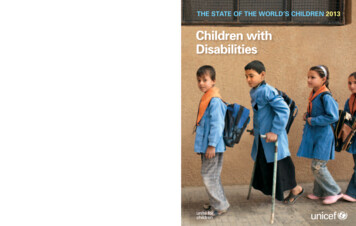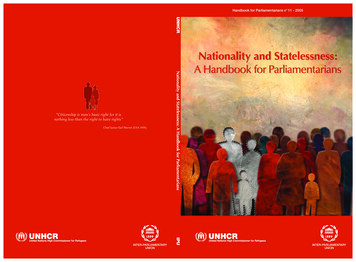
Transcription
Handbook for Parliamentarians n 11 - 2005UNHCRChief Justice Earl Warren (USA 1958).IPUINTER-PARLIAMENTARYUNIONNationality and Statelessness: A Handbook for Parliamentarians“Citizenship is man’s basic right for it isnothing less than the right to have rights”Nationality and Statelessness:A Handbook for ParliamentariansINTER-PARLIAMENTARYUNION
Nationality and StatelessnessA Handbook for Parliamentarians
AcknowledgementsThis handbook was prepared with the cooperation of the Bureau of the InterParliamentary Union’s Standing Committee on Democracy and Human Rights.Research and analysis: Carol Batchelor and Philippe Leclerc (UNHCR)Writer: Ms. Marilyn AchironEditorial Board:UNHCR: Erika Feller, Philippe Leclerc, José Riera and Sara BaschettiIPU:Anders B. Johnsson and Kareen JabreOriginal version: EnglishCover design by Jacques Wandfluh, Studio Infographie, SwitzerlandPrinted in Switzerland by Presses Centrales de Lausanne2
Foreword“Everyone has the right to a nationality. No one shall be arbitrarily deprived of hisnationality nor denied the right to change his nationality.” With those succinctstatements, Article 15 of the 1948 Universal Declaration of Human Rights confers uponevery individual, everywhere in the world, the right to have a legal connection with aState. Citizenship or nationality (the two terms are used interchangeably in this hanbook,just as they usually are in international law) not only provides people with a sense ofidentity, it entitles individuals to the protection of a State and to many civil and politicalrights. Indeed, citizenship has been described as “the right to have rights.”Despite the body of international law relating to the acquisition, loss, or denial ofcitizenship, millions of people around the world have no nationality. They are stateless.Statelessness may result from a variety of causes, including conflict of laws, the transferof territory, marriage laws, administrative practices, discrimination, lack of birth registration,denationalization (when a State rescinds an individual’s nationality), and renunciation(when an individual refuses the protection of a State).Many of the world’s stateless persons are also victims of forced displacement. Peoplewho have been uprooted from their homes are particularly vulnerable to statelessness,especially when their displacement is accompanied or followed by a redrawing ofterritorial boundaries. Conversely, stateless and denationalized individuals have oftenbeen obliged to flee their usual place of residence. It is this link with refugee situationsthat initially led the United Nations General Assembly to designate the Office of theUnited Nations High Commissioner for Refugees (UNHCR) as the agency responsiblefor overseeing the prevention and reduction of statelessness.According to recent estimates there are some eleven million stateless persons aroundthe world. But this number is a “guesstimate”. It has been very difficult for organizationsto collect comprehensive data on the number of stateless persons because the conceptof statelessness is disputed among countries, because governments are often reluctantto disclose information about statelessness, and because the issue of statelessness isnot high on the international community’s agenda.In recent years, however, the international community has become more aware thatrespect for human rights helps to prevent mass exoduses and forced displacements.Similarly, there is growing awareness, based on the principles contained in internationaltreaties, that States are obliged to resolve problems of statelessness. Governmentsmust acknowledge, formally and in practice, that they do not have the right to withdrawor withhold the benefits of citizenship from individuals who can demonstrate a genuineand effective link with the country.The best way that parliamentarians can demonstrate their determination to reduce oreliminate the incidence of statelessness is to adopt national legislation that is consistentwith international law, that ensures that individuals will not be arbitrarily deprived ofnationality, that persons will be granted a nationality under certain circumstances inwhich they might otherwise be stateless, and that adequate protection will be available3
to those who remain or become stateless. Parliamentarians can also play an important“watchdog” role by helping to ensure that the policies of a State do not inadvertently ordeliberately render individuals stateless, by encouraging their governments to resolvethe cases of individuals who are stateless, and by raising awareness about the problemsassociated with statelessness among their constituents.This handbook presents related issues, provides possible solutions, and suggests actionsthat members of parliament can take without losing sight of the human dimension ofstatelessness. We hope that it will serve as a useful tool for parliamentarians in taking allnecessary steps to reduce and ultimately eliminate this phenomenon, which adverselyaffects the lives of millions of men, women and children around the world.António GuterresUnited NationsHigh Commissioner for Refugees4Anders B. JohnssonSecretary GeneralInter-Parliamentary Union
Table of pter 1: The International Legal Framework for the Rightto a Nationality and for the Reduction of Statelessness8Chapter 2: Identifying and Protecting Stateless Persons17Chapter 3: Eliminating the Causes of Statelessness27Chapter 4: UNHCR’s Role43Chapter 5: How Parliamentarians Can Help48Annex 1:States Parties to the 1954 United Nations Conventionrelating to the Status of Stateless Persons53States Parties to the 1961 United Nations Conventionon the Reduction of Statelessness55Annex 3:Model Instruments of Accession56Annex 4:UNHCR Representations58Annex 2:UNHCR and IPU in Brief675
IntroductionThose of us who are citizens of a country usually take for granted the rights and obligationsthat citizenship confers on us. Most of us can enroll our children in schools, seek medicalattention when we are sick, apply for employment when we need to, and vote to elect ourrepresentatives in government. We feel we have a stake in the country in which we live;we feel a profound sense of belonging to something greater than our individual selves.But what is life like for persons who have no nationality, who are stateless? Withoutcitizenship, a person cannot register to vote in the country in which he/she is living, cannotapply for a travel document, cannot register to marry. In some instances, individuals whoare stateless and are outside their country of origin or country of former residence can bedetained for long periods if those countries refuse to grant them re-entry to their territories.Often, even the most basic of rights – the rights to education, medical care, andemployment – are denied to individuals who cannot prove a legal connection with a country.“Being said ‘No’ to by the country where I live; being said ‘No’ to by thecountry where I was born; being said ‘No’ to by the country where myparents are from; hearing ‘you do not belong to us’ continuously! I feelI am nobody and don’t even know why I’m living. Being stateless, youare always surrounded by a sense of worthlessness.”Lara, who was formerly statelessA survey on statelessness conducted by UNHCR in 2003 confirms that no region of theworld is free of the problems that lead to statelessness. However, the precise number ofstateless persons around the world is unknown. States are often unwilling or unable toprovide accurate data; few have mechanisms for registering stateless persons. Indeed,there is no clear requirement for States to report on the numbers of stateless personsliving on their territories. UNHCR estimates that millions of people around the world areliving without an effective nationality.Statelessness, which was first recognized as a global problem during the first half of the20th century, can result from disputes between States about the legal identity of individuals,State succession, protracted marginalization of specific groups within the society, orfrom stripping individuals or groups of their nationality. Statelessness is normallyassociated with periods of profound change in international relations. The redrawing ofinternational borders, the manipulation of political systems by national leaders with the aimof achieving questionable political ends, and/or the denial or deprivation of nationalityto exclude and marginalize unpopular racial, religious, or ethnic minorities have resultedin statelessness in every region of the world. In the past 20 years, growing numbers ofpersons have been deprived of their nationality or have not been able to gain an effectivecitizenship. If these situations are allowed to continue, the deepening sense ofdisenfranchisement among the affected populations can eventually lead to displacement.6
“To be stripped of citizenship is to be stripped of worldliness; it is likereturning to a wilderness as cavemen or savages A man who isnothing but a man has lost the very qualities which make it possiblefor other people to treat him as a fellow man they could live and diewithout leaving any trace, without having contributed anything to thecommon world.”Hannah Arendt, The Origins of TotalitarianismThis handbook aims to provide parliamentarians with a broad description of the internationalprinciples regulating nationality and statelessness. International law gives States broaddiscretion with which to define their initial body of citizens and the conditions for acquiring,losing, and retaining citizenship. However, human rights principles developed throughoutthe 20th century limit this latitude if it results in statelessness and/or if it is applied in adiscriminatory manner.As States work together to address the problems associated with statelessness, thereare still millions of individuals around the world who have no effective nationality. Thishandbook discusses the rights and obligations of stateless persons as protected underinternational law, particularly by the 1954 Convention relating to the Status of StatelessPersons. (Despite UNHCR’s promotion efforts, only 57 States have ratified the 1954Convention; in comparison, 146 States have ratified the 1951 Convention relating to theStatus of Refugees.) The handbook also highlights the main causes of statelessnessand considers how governments can ensure that the application of their nationalitylegislation doesn’t inadvertently result in statelessness.UNHCR is the UN agency tasked with helping to reduce the incidence of statelessnessand assisting those individuals who are stateless in securing an effective nationality.This handbook describes what UNHCR does to fulfil this role. It also suggests practicalsteps parliamentarians can take to help to reduce the incidence of statelessness, fromreviewing and, if necessary, revising their country’s citizenship laws, to encouraging theirgovernments to accede to international treaties on statelessness, to raising public awarenessabout the problems associated with statelessness.This handbook also offers positive examples of how protracted situations of statelessnesshave been resolved, thanks to the political will of the States concerned, the involvement ofcivil society, and the assistance provided by the international community. These “goodpractices” illustrate that when governments, society, and the international communitywork together, stateless individuals can finally enjoy “the right to have rights”.7
Chapter 1The International Legal Framework for the Right toa Nationality and for the Reduction of StatelessnessNationality is a highly sensitive issue as it is a manifestation of a country’s sovereigntyand identity. Not surprisingly, disputes about citizenship can, and often do, result in tensionand conflict, both within and between States. During the 20th century, there was both anincrease in the incidence of statelessness around the world and growing awareness ofand concern for human rights. International law on nationality thus evolved along twotracks: to protect and assist those individuals who were already stateless, and to try toeliminate, or at least reduce, the incidence of statelessness.Who determines whether or not a person is a citizen of a particular country?In principle, questions of nationality fall within the domestic jurisdiction of each State.However, the applicability of a State’s internal decisions can be limited by the similaractions of other States and by international law.In its Advisory Opinion on the Tunis and Morocco Nationality Decrees of 1923, thePermanent Court of International Justice stated that:“The question whether a certain matter is or is not solely within the domesticjurisdiction of a State is an essentially relative question; it depends on thedevelopment of international relations.”In effect, the Permanent Court said that while nationality issues were, in principle, withindomestic jurisdiction, States must, nonetheless, honour their obligations to other Statesas governed by the rules of international law.This approach was reiterated seven years later in the Hague Convention on CertainQuestions Relating to the Conflict of Nationality Laws. Indeed, many Statescommented on the Permanent Court’s 1923 Advisory Opinion as it related to thepreparation of the 1930 Hague Convention on Nationality. Most States interpreted theAdvisory Opinion as a limitation on the applicability of a State’s nationality-related decisionsoutside that State, especially when those decisions conflict with nationality-relateddecisions made by other States.The Hague Convention of 1930, held under the auspices of the Assembly of the Leagueof Nations, was the first international attempt to ensure that all persons have a nationality.Article 1 of the Convention states that:“It is for each State to determine under its own law who are its nationals. This lawshall be recognized by other States in so far as it is consistent with internationalconventions, international custom, and the principles of law generally recognizedwith regard to nationality.”8
In other words, how a State exercizes its right to determine its citizens should conform tothe relevant provisions in international law. Throughout the 20th century, those provisionsgradually developed to favour human rights over claims of State sovereignty.Article 15 of the 1948 Universal Declaration of Human Rights declares:“Everyone has the right to a nationality. No one shall be arbitrarily deprivedof his nationality nor denied the right to change his nationality.”This right is founded on the existence of a genuine and effective link between an individualand a State. The first time this link was acknowledged as the basis of citizenship wasin a case decided by the International Court of Justice in 1955, the Nottebohm Case.In that case, the Court stated that:“According to the practice of States, to arbitral and judicial decisions and tothe opinion of writers, nationality is a legal bond having as its basis a social factof attachment, a genuine connection of existence, interest and sentiments,together with the existence of reciprocal rights and duties.”The genuine and effective link, made manifest by birth, residency, and/or descent, is nowreflected in the provisions of most States’ nationality legislation as well as in recentinternational instruments relating to nationality, such as the 1997 European Convention onNationality.Nationality is also defined by the Inter-American Court of Human Rights as“the political and legal bond that links a person to a given State and bindshim to it with ties of loyalty and fidelity, entitling him to diplomatic protectionfrom that State” (Castillo-Petruzzi et al v. Peru, Judgment of May 1999,IACHR [ser.C] No. 52 1999).How are the rights of refugees and stateless persons protected?Although Article 15 of the Universal Declaration of Human Rights asserts that everyperson has the right to a nationality, it does not prescribe the specific nationality towhich a person is entitled. To ensure that individuals are not deprived of a minimumset of rights associated with nationality, the international community developed two maintreaties: the 1951 Convention relating to the Status of Refugees and the 1954 Conventionrelating to the Status of Stateless Persons.Is there any link between the 1951 Convention relatingto the Status of Refugees and the issue of statelessness?In the aftermath of World War II, one of the most pressing issues for the member Statesof the newly created United Nations was how to address the needs of the millions ofindividuals whom the war had left as refugees or had rendered stateless. A 1949 resolutionof the UN Economic and Social Council (ECOSOC) led to the appointment of an AdHoc Committee whose task was to consider formulating a Convention on the status ofrefugees and stateless persons and to consider proposals for eliminating statelessness.9
In the end, Committee members drafted a Convention on the status of refugees and aProtocol to the proposed Convention that focused on stateless persons. The Committeedid not fully address the elimination of statelessness largely because it was assumedthat the newly formed International Law Commission (ILC) would focus on that issue.Historically, refugees and stateless persons both received protection and assistance fromthe international refugee organizations that preceded UNHCR. The draft Protocol onStatelessness was intended to reflect this link between refugees and stateless persons.But the urgent needs of refugees and the impending dissolution of the InternationalRefugee Organization meant that there was not sufficient time for a detailed analysisof the situation of stateless persons at the 1951 Conference of Plenipotentiaries thathad been convened to consider both issues. Thus, the 1951 Convention relating to theStatus of Refugees was adopted at the Conference, while adoption of the Protocoladdressing stateless persons was postponed for a later date.Under the 1951 Refugee Convention, a stateless refugee receives protection as arefugee, since the arbitrary denial of citizenship because of a person’s race, religion,nationality, membership in a particular social group, or political opinion can indicatethat the individual should be recognized as a refugee.What does the 1954 Convention relatingto the Status of Stateless Persons provide for?The Protocol on stateless persons that had been drafted as an addendum to the1951 Refugee Convention was made into a Convention in its own right in 1954. The1954 Convention is the primary international instrument that aims to regulate andimprove the status of stateless persons and to ensure that stateless persons areaccorded their fundamental rights and freedoms without discrimination. (See Annex 1for a list of States Parties to the 1954 Convention.)The provisions of the Convention are, in many respects, very similar to those of the1951 Refugee Convention. Acceding to the Convention is not a substitute for grantingnationality to those born and habitually resident in a State’s territory. No matterhow extensive the rights granted to a stateless person may be, they are not the equivalentof acquiring citizenship.The 1954 Convention includes a strictly legal definition of a stateless person: “a personwho is not considered as a national by any State under the operation of its law” (what isknown as de jure stateless).Who is a national? Who is stateless?To be considered a national by operation of law means that an individualis automatically considered to be a citizen under the terms outlined in theState’s enacted legal instruments related to nationality or that the individualhas been granted nationality through a decision made by the relevant10
authorities. Those instruments can be a Constitution, a Presidential decree,or a citizenship act. Most people are considered nationals by operation ofonly one State’s laws – usually either the laws of the State in which theperson was born (jus soli) or the laws of the State of which the person’sparents were nationals when the individual was born (jus sanguinis).Whenever an administrative procedure allows for discretion in grantingcitizenship, applicants for citizenship cannot be considered nationals untiltheir applications have been completed and approved and the citizenshipof that State is granted in accordance with the law. Individuals who haveto apply for citizenship, and those whom the law defines as eligible to apply,but whose applications are rejected, are not citizens of that State byoperation of that State’s law.Individuals who have not received nationality automatically or through anindividual decision under the operation of any State’s laws are knownas de jure stateless persons: persons who are stateless with referenceto applicable law.It is presumed that an individual has a nationality unless there is someevidence to the contrary. However, sometimes the States with which anindividual might have a genuine link cannot agree as to which of them isthe State that has granted citizenship to that person. The individual isthus unable to demonstrate that he/she is de jure stateless, yet he/she hasno effective nationality and does not enjoy national protection. He/Sheis considered to be de facto stateless.Although the Convention’s drafters felt it was necessary to make the distinction betweende jure stateless persons (those who have not received nationality automatically orthrough an individual decision under the operation of any State’s laws) and de factostateless persons (those who cannot establish their nationality), they did recognize thesimilarity of their positions. The Final Act of the Convention addresses the issue of defacto stateless persons with a non-binding recommendation:“that each Contracting State, when it recognizes as valid the reasons for whicha person has renounced the protection of the State of which he is a national,consider sympathetically the possibility of according to that person the treatmentwhich the Convention accords to stateless persons.”The decision as to whether a person is entitled to the benefits of the Convention ismade by each State Party in accordance with its own established procedures. Throughits representations/offices or its services at Headquarters, UNHCR is available to provideadvice on how to create and implement these procedures, if requested. (See Annex4 for a list of UNHCR offices.)11
Can a stateless person also be a refugee?Individuals who are de facto stateless are not included in the 1954Convention’s definition of a stateless person. The drafters of the1954 Convention presumed that all persons without an effectivenationality – that is, all de facto stateless persons – were refugees. (The draftersof the Convention assumed that an individual became de facto statelessafter fleeing his/her country of nationality because of persecution bythe State, and that that persecution was related to a lack of effectivecitizenship.) Given this assumption, de facto stateless persons receiveinternational assistance under the provisions of the 1951 Conventionrelating to the Status of Refugees.However, being de jure or de facto stateless does not necessarily signifypersecution (a “well-founded fear of persecution” is the crux of thedefinition of a refugee as set out in the 1951 Convention relating to theStatus of Refugees). It has become clear over the years that there arede facto stateless persons who do not acquire citizenship in their countryof habitual residence yet who do not qualify as either refugees or as de jurestateless persons. Indeed, most stateless persons who require assistancefrom UNHCR, whether they are de jure or de facto stateless, are notrefugees and have no claim to asylum.What does the 1961 Conventionon the Reduction of Statelessness provide for?In August 1950, an ECOSOC Resolution requested that the ILC prepare a draft internationalConvention or Conventions for the elimination of statelessness. The ILC draftedtwo Conventions for consideration, both addressing the problem of statelessness resultingfrom conflicts of laws. One Convention, on the elimination of future statelessness, containedprovisions that went much further than those contained in the second draft Convention,which focused on reducing the incidence of statelessness in the future. Participants in aconference convened to consider the issue determined that the former Convention was tooradical and elected to work with the draft Convention on the Reduction of Future Statelessness.The instrument that finally emerged from this process is the 1961 Convention on theReduction of Statelessness. (See Annex 2 for a list of States Parties to the 1961Convention.)The articles of the Convention aim to avoid statelessness at birth, but they neitherprohibit the possibility of revocation of nationality under certain circumstances, norretroactively grant citizenship to all currently stateless persons. The Convention also providesfor the creation of a body to which a person who may benefit from the provisions of theConvention may apply to have his/her claim examined and to seek assistance in presentingthe claim to the appropriate authority. The General Assembly subsequently asked UNHCRto fulfill this role.The ILC and State delegates determined that international assistance was necessarybecause when an individual is denied citizenship of a State, he/she would have neither12
the financial resources nor the expertise required to present a claim to nationality to theauthorities of that State. Since no other State could plausibly argue for the individual, itfor doing so. Representation by an international agency would also sidestep the questionof whether or not an individual was a subject of international law. In addition, an agencydevoted to this work would eventually develop expertise on the issue that would beuseful not only for advising concerned individuals, but also for proposing ways of acquiringan effective nationality and of reducing statelessness, in general.In seeking to reduce the incidence of statelessness, the 1961 Convention requires thatsignatory States adopt nationality legislation that reflects prescribed standards relatingto the acquisition or loss of nationality. Should disputes concerning the interpretationor application of the Convention arise between Contracting States and they are notresolved by other means, they can be submitted to the International Court of Justice atthe request of any one of the parties to the dispute.The Final Act of the Convention includes a recommendation much like the one containedin the Final Act of the 1954 Convention that encourages States Parties to extend theprovisions of the Convention to de facto stateless persons whenever possible.“One day, I was standing between the borders, and could not get intoeither country. It was the most unforgettable experience in my life!I could not enter the State where I had been; also I couldn’t get into theState where I was born, raised and lived! Where do I belong? I stillcannot forget the strong feeling of loss I experienced at the airport.”Chen, who was formerly statelessHow does human rights law ensure the right to a nationality?Various other international legal instruments address the right to a nationality. The1957 Convention on the Nationality of Married Women echoes the Universal Declarationof Human Rights by stipulating the right to a nationality and the right not to be deprived ofa nationality. It also seeks to promote “universal respect for, and observance of, humanrights and fundamental freedoms for all without discrimination as to sex.” The first threeArticles of the Convention contain specific provisions concerning a wife’s nationality:Article 1 asserts that “neither the celebration nor the dissolution of a marriagebetween one of its nationals and an alien, nor the change of nationality by thehusband during marriage, shall automatically affect the nationality of the wife.”Article 2 states that “neither the voluntary acquisition of the nationality ofanother State nor the renunciation of its nationality by one of its nationalsshall prevent the retention of its nationality by the wife of such national.”Article 3, which is divided into two parts, states that “the alien wife of one of[the Contracting State’s] nationals may, at her request, acquire the nationalityof her husband through specially privileged naturalization procedures” andthat “the grant of such nationality may be subject to such limitations as may beimposed in the interests of national security or public policy.” It also stipulates13
that the Contracting State shall not construe the Convention “as affecting anylegislation or judicial practice by which the alien wife of one of its nationalsmay, at her request, acquire her husband’s nationality as a matter of right.”The 1965 Convention on the Elimination of All Forms of Racial Discriminationobliges States to “guarantee the right of everyone, without distinction as to race, colour,or national or ethnic origin, to equality before the law,” particularly in the enjoyment ofseveral fundamental human rights, including the right to nationality (Article 5).Article 24 of the 1966 International Covenant on Civil and Political Rights states that:“Every child shall have, without any discrimination as to race, colour, sex,language, religion, national or social origin, property or birth the right to suchmeasures of protection as are required by his status as a minor, on the partof his family, society and State.”“Every child shall be registered immediately after birth and shall have a name.”“Every child has the right to acquire a nationality.”Article 26 of that Covenant also asserts that “All persons are equal before the law andare entitled without any discrimination to the equal protection of the law. In this respect,the law shall prohibit any discrimination and guarantee to
Nationality and Statelessness: A Handbook for Parliamentarians Handbook for Parliamentarians n 11 - 2005 INTER-PARLIAMENTARY UNION "Citizenship is man's basic right for it is
